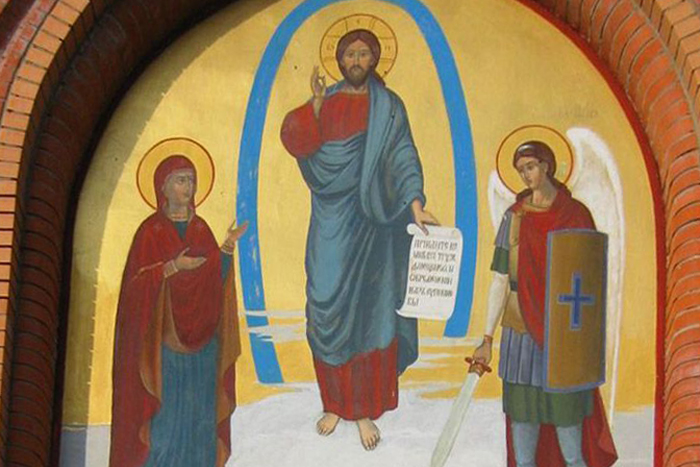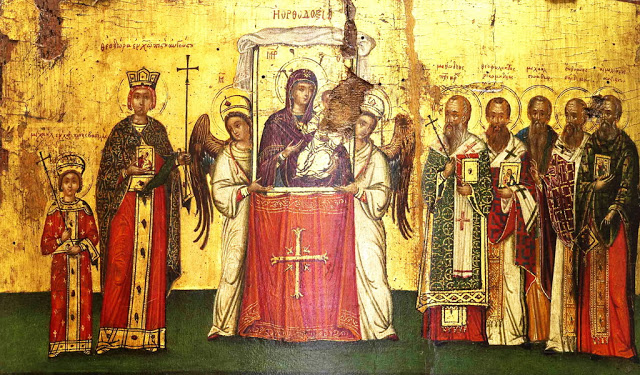Today is commonly known as Meatfare Sunday, the last day to eat meat before Pascha; it’s western equivalent used to be Carnival (from Latin to remove meat) but in the west removing meat doesn’t have much meaning anymore. But today’s real impact is so much more than just what we eat. Liturgically this is the Sunday devoted to The Last Judgment and it is critical to know that Chapter 25 of St. Matthew’s gospel from which Christ’s sermon about the sheep and goats takes place after Palm Sunday, His triumphant entry into Jerusalem, and was told by Our Lord only to His apostles on the Mount of Olives, away from the crowds of Jerusalem. That’s why this gospel is read again on Holy Tuesday, exactly 50 days from Meatfare. Our Lord’s private sermon is remarkable in the language that He chose to use to explain things to the apostles, not in a parable, now at the end of His ministry, directly. He makes it clear that His second coming will be with “glory” with “holy angels” as opposed to His first coming, as He was right then and there on earth knowing that later in that week He would suffer the dishonor and indignities of being tried, scourged, and crucified. Christ also uses the phrase “inherit the kingdom” to show that God has made the blessed of His Father, whom he refers to as the sheep on His right hand, to be true sons, not to be GIVEN eternal life, but to INHERIT what is rightly theirs, eternal life that was prepared for all men from the beginning of time. On the other hand, the left hand that is, are the goats. To the goats, He uses the words “depart from Me” signifying what hell really is: Being utterly cut off from God. Remember the words of Psalm 50 (Psalm 51 KJV): “Cast me not away from thy presence and take not thy Holy Spirit from me.”
In the west, the Last Judgment is a fearful thing. It brings to mind the fire and brimstone sermons that were popularized in Colonial America by preachers such as Jonathon Edwards, grandfather of Aaron Burr who killed Alexander Hamilton in a duel, who is famous for his fiery “Sinners in the Hands of an Angry God.” An angry God. That motif of an Angry God is manifest in the famous Last Judgment fresco in the Sistine Chapel in which Michaelangleo paints Christ sitting on the Judgment Seat with His right arm upraised in a threatening position and His left arm repelling the condemned goats on His left.
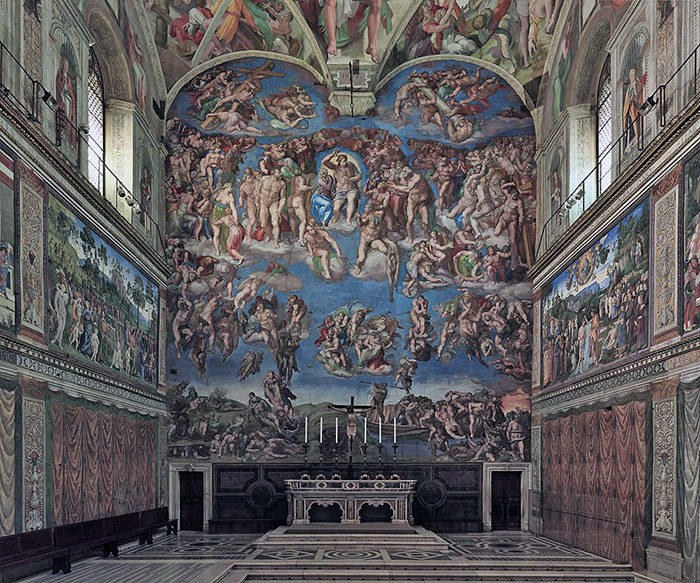
Compare that Sistine fresco with eastern icons of the Last Judgment, such as one by Victor Vasnyetsov that pictures Christ on the Judgment Seat quite differently, holding the emblem of the Life Giving Cross in one hand and the Gospel Book in the other (usually open to the famous “Come unto me all ye that labour and are heavy laden and I will give you rest”), the Righteous Judge, but certainly not an Angry God.
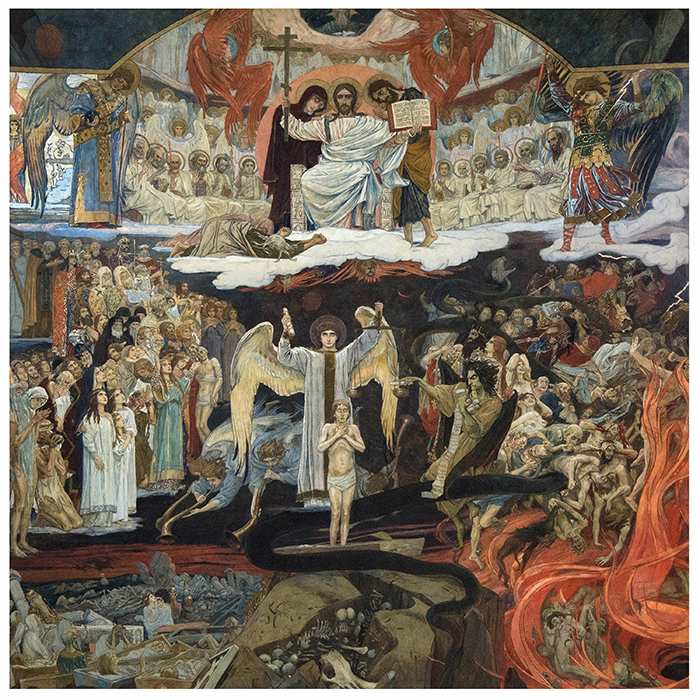
In many churches in Russia an icon or a fresco of the Last Judgment is strategically placed at the back of the church so that believers leaving the church are reminded of Christ’s upcoming Second Coming as they walk out into the world to practice Christianity face to face with their neighbors.
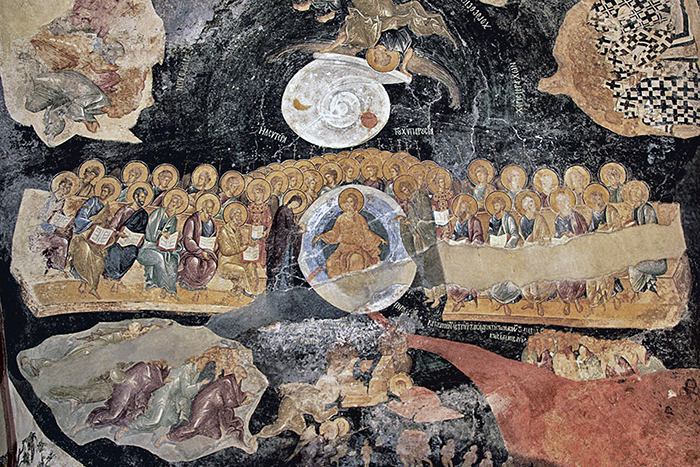
The difference between west and east is not more stark than comparing the words of the Orthodox vespers for Meatfare: “when Thou sittest on Thy throne O Merciful Judge and revealest Thy dread glory……. with my whole heart I cried to the all compassionate God” with the words of Jonathan Edwards: “There is nothing that keeps the wicked men at any one moment out of hell but the mere pleasure of God.”
Brothers and Sisters, the difference is highlighted by how one answers question: For what does the Church exist? When posed with that question recently, our Metropolitan Hilarion Alfeyev, whom many of us were so blessed to meet in person last year, gave this answer: “To save people, to save them from sin, the devil, and all that is associated in our lives with evil, vice, and what as we say leads to the destruction of the human soul.” That’s it! That is the task of the Orthodox Church: to save each one of us individually from being told “Depart from Me.” Fr. Alexander Schmemann hits the nail right on the head when writing on the theme of the Sunday of the Last Judgment: the theme is not fear of an Angry God, but love, “concrete and personal love for any human person that God makes us encounter in our lives.” He is so right when he says that in modern America Christians tend to “identify Christian love with political, economical, and social concerns.” With love for “mankind” rather than love for the very man who is standing right there in front of you. The latter, that’s the kind of love that God has—a love for each one of us, created in his image and likeness, for each of us AS INDIVIDUALS. One by one. Our jobs on earth, and especially during this fast approaching Great Lent, is to fill the sinful world with this kind of personal love and by doing so become more like God, get closer to God, just as we are all called…… to be saintly. That’s the same love exhibited by the compassionate Judge, the just Judge, the merciful Judge in the icon of Christ seated on the Judgment Seat holding the Cross and the Gospel. The Judge with love for each individual person is the Head of our Church, the Head of the Church Who came to save us, to fulfill the mission of His Church to save each one of us. Who yearns that we INHERENT the Kingdom for which we were made. Otherwise, what is referred to as a church is a mere social agency, devoted to the abstract and undefined task of caring for “humanity” rather than helping each one of us to keep from being goats.
Source: http://www.pravmir.com/the-last-judgment-what-is-a-church/


